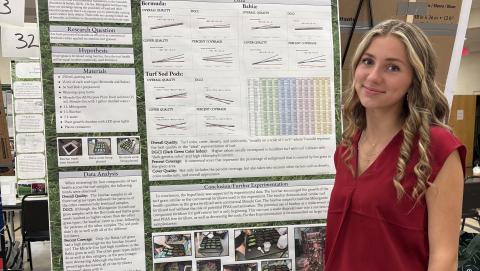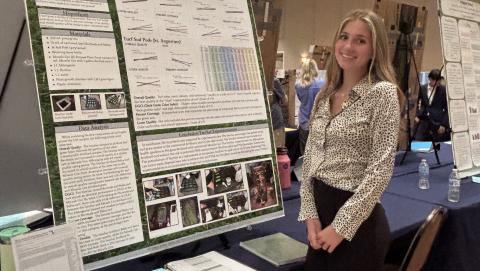What began as a bold idea by a high school science enthusiast quickly evolved into a transformative force for environmental change in The Villages, Florida. Junior Sarah Colley from The Villages Charter School collaborated with Jacobs — a global leader in sustainable solutions and The Villages’ contract operator — to tackle one of today’s most pressing environmental challenges for wastewater operators: per- and polyfluoroalkyl substances (PFAS) in biosolids.
It all began with a question
Last fall, Jacobs hosted an innovation workshop with key stakeholders in The Villages to showcase results-driven technologies, evaluate forward-thinking solutions and prioritize actionable strategies to address evolving water and wastewater needs. Sarah attended the workshop and was inspired by a discussion on the production of biochar — a charcoal-like substance produced from biosolids using pyrolysis — and its potential use as a fertilizer for The Villages’ 56 turfgrass golf courses.
“Converting biosolids into biochar creates a high-quality fertilizer product that reduces greenhouse gas emissions, removes PFAS contamination and enhances soil properties,” says Jacobs Project Manager Lenard Scroggins.
With the support of Jacobs and The Villages’ golf course maintenance team, Sarah pursued a science fair project — Turf Response to Biochar Application — to explore the use of biochar as golf course fertilizer to reduce the need for and cost of commercial fertilizer products.
Her science fair question: Can heat-processed biosolids be as effective as commercial fertilizers when applied to a common golf course turfgrass?
Testing a real-world solution
Sarah’s eight-week experiment compared turfgrass grown from Jacobs-supplied biochar from the North Sumter Utilities Wastewater Treatment Plant (WWTP) to turfgrass grown from standard commercial fertilizers. She also tested mature turf sod to compare results.
Golf courses were ideal for the experiment — they require large volumes of fertilizers and turf products and can be a source of nutrient runoff that threatens groundwater quality. If biochar performs comparably, it could offer an affordable, sustainable and more environmentally friendly alternative.
Sarah monitored turfgrass health using digital image analysis and tracked key metrics, including:
- Dark green color index
- Cover quality
- Percent coverage
- Overall quality
Sarah’s research concluded that the biochar fertilized turfgrass demonstrated a similar growth and health pattern to the commercial fertilizer.
Lenard expresses, “Jacobs is proud to support Sarah’s efforts to help foster the next generation of scientists and environmental leaders.”
Innovation and industry acclaim
Sarah presented her work at local, regional, state and international science fair competitions, claiming numerous awards.
The Villages Utilities and Executive Golf Department and Jacobs will continue to work with Sarah to refine the methodology and explore wider implementation, with the goal of scaling the biochar strategy to all golf courses in the community and other landscaping needs. This will maximize the reuse potential of the WWTP’s biosolids and reduce the cost of commercial fertilizer. The Villages is also evaluating the feasibility of building a dedicated biochar or similar large-scale production facility, which could help generate new revenue from what was once a waste stream.
An award-winning reunion
In 2024, Jacobs established a relationship with The Villages Charter School to support science, technology, engineering, arts and math (STEAM) curriculum. Jacobs staff regularly mentor students with hands-on research projects, including Sarah.
Sarah is no stranger to scientific success. She previously completed an award-winning science fair project about phytoremediation in coordination with Jacobs and the North Sumter County Utility Dependent District in The Villages.
“Sarah continues to break barriers with her curiosity and pursuit of ‘what if?’” adds Lenard. “Her work exemplifies community collaboration and sets a high standard for what student-led projects can achieve when it comes to addressing real-world problems.”
Jacobs provides complete operations and maintenance of public and private utility systems for The Villages, in addition to solid waste collection.














































